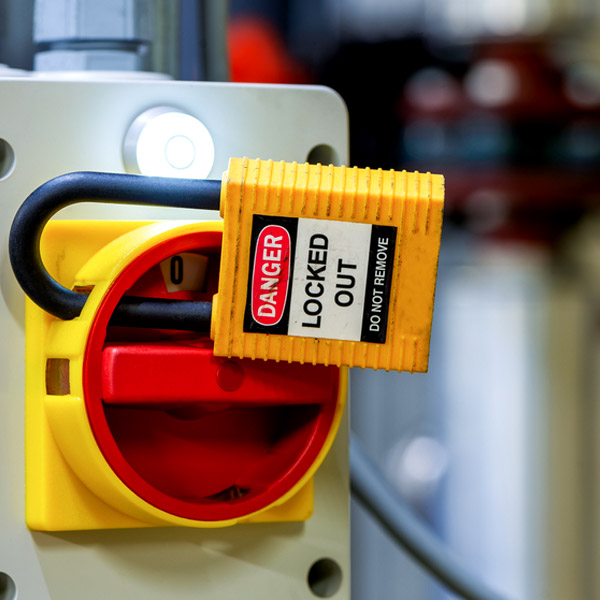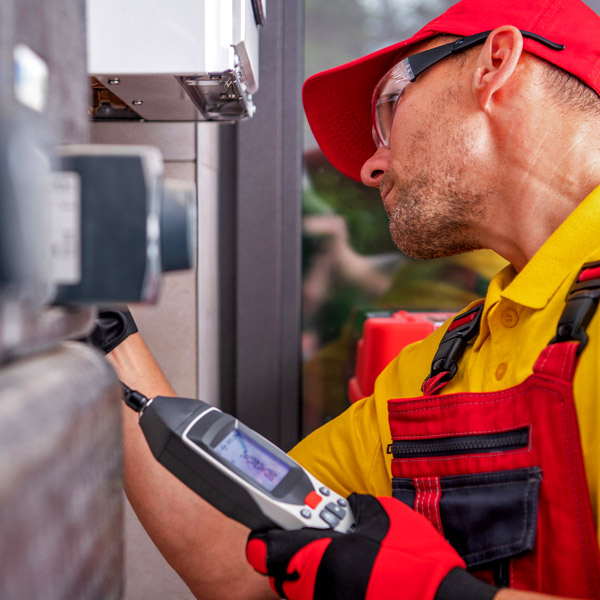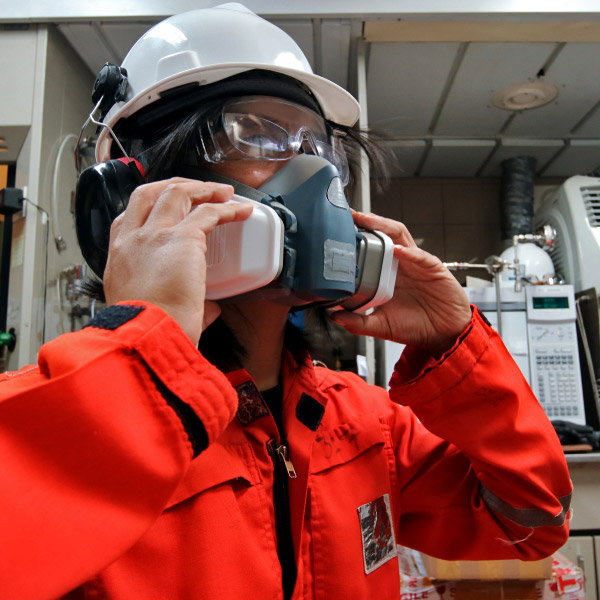
Compliance Services
- Contractor safety management program
- Customized fall protection solutions
- Safety program development and review
- Safety project management (General industry/construction)
- Site safety audit (Compliance audit)
In addition to Wesco’s vast selection of trusted safety products, we take pride in our broad portfolio of safety services, consulting, and training.
You can rely on our team of safety experts to create comprehensive, customizable safety solutions to help you improve productivity, increase profitability, and mitigate risk.
Wesco’s safety experts are professionally trained and led by Certified Safety Professionals. Our expertise has been built through countless customer engagements across various industries, so you can rely on us to develop and deliver tailored solutions to solve your business’s safety challenges. Our expert consultants will work closely with your company’s leadership team to develop and implement tailored safety management programs. Our safety services are available as either project-based solutions to address one-time needs, or as an ongoing, affordable subscription-based solution to handle your compliance needs over the long term.




Training is an essential element of a workplace safety program, and our safety experts create tailored safety training programs to fit the specific needs of your business. We are proud to offer a wide variety of on-site and virtual safety trainings to meet your organization’s requirements and keep your workers safe.
Our 10-hour OSHA training program is intended for entry level workers, and is the most common voluntary outreach training program that employers seek. Our 30-hour training program is intended to provide workers with safety responsibility a greater depth of OSHA-related information. All training provides an overview of the hazards a worker may encounter on a job site. Emphasis is placed on hazard identification, avoidance, and control/prevention. We will accommodate audience needs to customize the content (although most of the curriculum has mandatory topics and timeframes specified).
Falls are the #1 cause of death in the construction industry and consistently the most commonly cited OSHA standard. Lack of proper safety training is currently #9 on the list of common OSHA violations.
OSHA regulations state that the employer shall provide a training program for each employee who might be exposed to fall hazards. Even without injury or death, OSHA can impose a fine for untrained workers. Make sure your facility is taking proper measures to mitigate the risk of injury and citations.
Workers performing service or maintenance on machinery and equipment may be exposed to injuries from the unexpected energization, startup of the machinery or equipment, or release of stored energy in the equipment. Employers must provide initial training before starting service and maintenance activities, as well as retraining as necessary. In addition, employers must certify that the training has been given to all employees covered by the Lockout/Tagout standard. Our customizable Lockout/Tagout Trainings can help ensure these guidelines are properly followed.
Many workplaces contain spaces that are considered to be “confined” because their configurations hinder the activities of employees who must enter into, work in, or exit from them. Often, employees who work in confined spaces face increased risk of exposure to serious physical injury from hazards such as entrapment, engulfment, and hazardous atmospheric conditions. If employees are expected to enter confined spaces, the employer is required to develop a written permit-required entry program and provide training for the entrant, attendant, and the supervisor.
Hazardous waste facilities and cleanup sites aren’t the only operations subject to OSHA’s HAZWOPER standard. Companies that generate hazardous waste through the normal course of business and are NOT a treatment/storage/disposable facility (TSDF)—or have the potential for accidental release of hazardous substances—are covered under this regulation. This 24-hour training is designed to meet the requirements for a Hazmat Technician, which is defined under the standard as “anyone who responds aggressively to stop the release of hazardous substances.” All HAZWOPER courses are taught by a qualified safety professional, and will include the following topics:
OSHA has developed the HAZWOPER (Hazardous Waste Operations and Emergency Response) program to protect workers at hazardous sites. These are extensive regulations that must be properly followed to ensure the health and safety of workers.
Wesco offers a course that meets the requirements outlined in OSHA 29 CFR 1910.120 for 8 hours of annual refresher training for workers at hazardous waste sites. The course topics include:
Does your company transport hazardous materials via ground? If so, your business is governed by the Pipeline and Hazardous Materials Safety Administration (PHMSA), a branch of the Department of Transportation (DOT), under Title 49, Chapter 2 of the Federal Code of Regulations.
PHMSA requires all employees involved in the shipping, transportation, or handling of hazardous materials to receive specific training within 90 days of employment in a Hazmat job; as well as refresher training every three years. With training-related infractions exceeding $450 per violation, per day, this class can be crucial to your business. Key topics taught by an experience professional includes:
OSHA regulations in 29 CFR 1910.332 require electrical safety training for any employees who may reasonably be expected to face risk of injury due to electric shock or other electrical hazards. This basic safety training must cover the safety-related electrical work practices that are mandated by other OSHA rules, as well as any additional safety practices that may be needed to keep workers safe.
Wesco provides these Electrical/Arc Flash Trainings, which can run from 30 minutes to 4 hours, depending if “qualified worker” documentation training is required, along with the complexity of the team’s current work environment. OSHA considers any workers who will work on or near exposed energized parts to be “qualified workers,” and those individuals need specialized training tohelp prevent electric shock. Other workers are considered “unqualified workers,” and primarily need training to recognize hazardous situations and keep away from them. “Qualified workers” must be trained to deal with those situations safely, as part of their duties.
Musculoskeletal disorders (MSDs) account for roughly one-third of all workplace injuries in the US. These injuries can become severe (and costly) very quickly, if not properly addressed. The best way to manage MSDs is to prevent them for occurring in the first place.
Conney Safety’s “Ergonomics: Assessing and Controlling Risks” course gives you the tools needed to identify ergonomic hazards in the workplace, and control them before they lead to a costly injury. During this course—taught by a qualified safety professional—you will learn how to assess ergonomic risks in your workplace. Topics will include:
Excavating is recognized as one of the most hazardous construction operations. Our Excavation/Trenching class is customized to either give basic excavation/trenching safety awareness or to help teach employees to be a Competent Person for a given work site (including all the requirements for the OSHA standard). Our courses ensure that students learn about various standardized construction practices for identifying and correcting hazards. Our customizable Excavation/Trenching Training topics can include:
Wesco offers First Aid/CPR/AED/Bloodborne Pathogen Training in all possible combinations, and we have retained certified trainers all over the country allowing us to offer competitive pricing no matter where you are located.
Through these offerings, we use the First Voice Training network, which is a dedicated training network of about 500 instructors that are accredited and train regularly using American Heart Association and National CPR/first aid science standards. Their core job duty and expertise is to perform First Aid/CPR/BBP and AED training on a regular basis, plus they are certified healthcare professionals who have experience with field rescue or public rescue situations. These skilled instructors will provide hands-on training to improve the health and safety of all your employees on the job. Our related training options include:
The employee “right to know” law has been a commonly cited OSHA standard since its inception in 1980. The Hazard Communication Standard is now aligned with the Globally Harmonized System of Classification and Labeling of Chemicals (GHS).
Our customizable Hazard Communication Trainings cover these topics and more! Trainings can commonly take between 45 minutes to 1.5 hours, depending on the nature of the business and the number of chemicals that the employees work with. This updated standard requires employers to train employees on understanding the following:
Transporting hazardous materials by air requires a great deal of care. These shipments are governed by the Dangerous Goods Regulations (DGR)—a resource published by the International Air Transport Association (IATA) to help organizations prepare, handle, and accept hazardous material shipments via air. Due to the potential catastrophic nature of Dangerous Goods shipments, strict training requirements are in place, with violations reaching $650 per violation, per day.
This course meets the requirement for initial and biennial refresher training. Learn how to be compliant with DGR in addition to these other key topics:
PPE is a very broad, but extremely important part of the employee safety education process. Employers are required to train each employee before they are allowed to perform work requiring the use of PPE. Training time can widely vary and is dependent on your company's needs. At minimum, employees must be trained to know the following: Selecting the correct PPE. Sizing the right PPE. What are the PPE’s limitations. When to discard PPE. Our customizable PPE Trainings can cover such topics as:
OSHA requires all powered industrial vehicle (PIV) operators to receive initial forklift training, after an incident/accident, and again every three years. The training should emphasize the workplace’s features that will affect how the vehicle must be operated aswell as the general safety rules applicable to operating any powered industrial vehicle. Our Forklift Trainings consist of a combination of formal instruction and practical training, and cover:
Noncompliance with hazardous waste regulations isn’t just bad for the environment, it’s bad for business. Fines associated with violating the EPA’s Resource Conservation and Recovery Act (RCRA) are currently being issued at a cost of $70,117 per day, per violation. Conney Safety’s RCRA course can help your company stay in compliance and avoid costly violations.
This course is designed to meet initial and annual refresher training requirements for all hazardous waste generators. All classes are taught by an experienced safety professional with extensive hazardous waste management experience. Key topics include:
OSHA has issued a standard (29 CFR 1926.1153) that requires General industry employers to limit worker exposures to respirable crystalline silica and to take other steps to protect workers. This standard requires engineering controls (such as water spray to control the dust, ventilation systems, or even vacuums) to help limit the exposure to this dangerous dust. If these engineering systems cannot adequately control the dust, then respirators will need to be provided. Some sites will be required to use air monitoring to determine employee exposures (if work activities do not cleanly fit into Table 1 of the standard). Our customized Respirable Crystalline Silica Trainings will teach employees:
On top of this, OSHA 1910.1053 is the new standard for addressing respirable crystalline silica in Construction. While exposure limits are the same, workplace control measures can be more challenging in a “non-construction” environment.
Every employer has a unique challenge when it comes to the respirable silica standard. Our customized training will address your specific work environment, giving the employees appropriate options to keep them safe when exposed to this dangerous substance. Employees will benefit by best understanding why this standard is so important to their health now and in the future. Classes will run approximately 1 – 2 hours.
Employees are required to wear respirators whenever engineering and work practice control measures are not adequate to prevent atmospheric contamination at the worksite. When employees must work in environments with insufficient oxygen or where harmful dusts, smokes, mists, fumes, gases, vapors, or sprays are present, they need respirators.
Training is essential for correct respirator use. Employers must teach supervisors and workers how to properly select, use, and maintain respirators—and we can help with this! Our Respiratory Protection Training options include: General Awareness Training (entry level): 15 - 30 minutes. Site-Specific Respirator Training (advanced level): 1 - 3 hours. Our Respiratory Protection Trainings are designed to cover:
We offer a wide variety of safety related trainings to meet your organization’s requirements and keep your workers safe.
Learn more about our safety trainings.
We’ve got you covered with an impressive portfolio of trusted safety products from industry-leading brands, as well as our own robust offering of private label products designed to help you create safer work environments.

Personal Protective Equipment (PPE)
We offer the equipment you need to minimize exposure to hazards like fall protection, masks and respirators, gloves, and other face and eye protection.

MRO Supplies
Wesco offers a wide variety of MRO equipment and supplies vital in keeping your production process running in great shape.

Job Site Safety
Let us help you eliminate hazards and help you adhere to industry best practices with a wide selection of first aid kits and safety signs.

Janitorial Supplies
We stock the most reliant industry cleaning and janitorial supplies that every facility needs to operate smoothly.

Wesco has been empowering our customers with the tools, knowledge, and expertise to optimize their MRO supply strategy for many years and continue to innovate new solutions in the MRO space.
Submit your information and one of our experts will be in touch shortly.